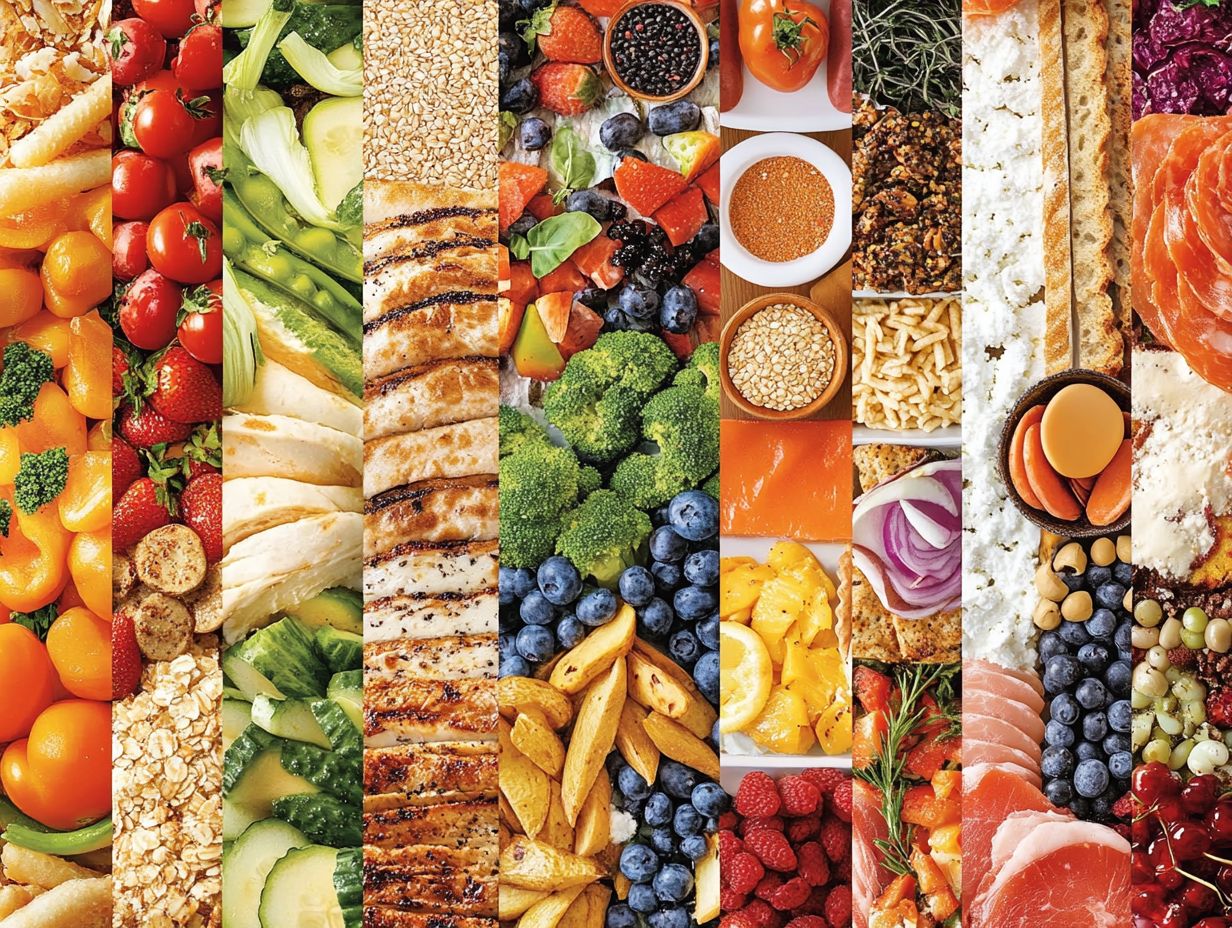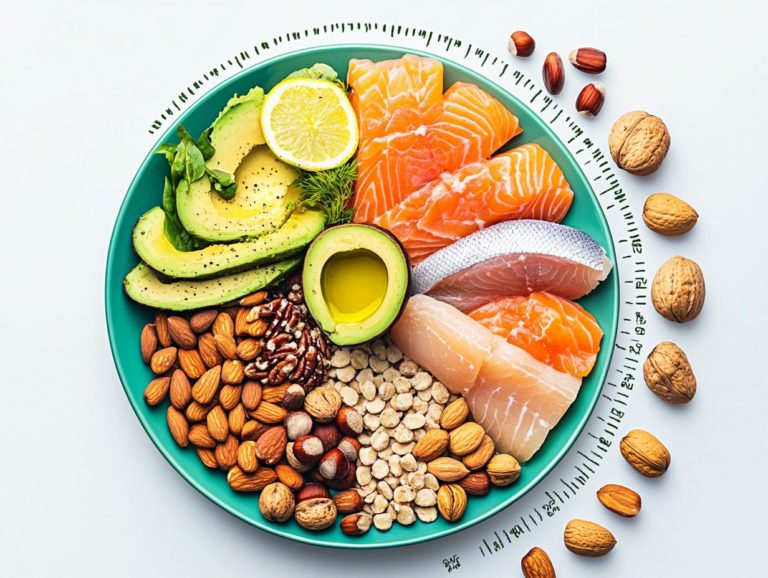5 Popular Dietary Trends and Their Guidelines
In today’s health-conscious world, dietary trends are taking center stage, each one highlighting its unique benefits and lifestyle transformations.
From the plant-based principles of the Vegan Diet to the low-carb allure of Keto, the array of eating patterns can feel utterly overwhelming.
This article delves into five prominent diets: Vegan, Keto, Paleo, Mediterranean, and Intermittent Fasting. We will unpack their fundamental principles, permitted foods, advantages and drawbacks, and practical tips for adopting them.
You’ll also discover guidance on selecting the right diet for your needs while maintaining a balanced lifestyle.
Join us as we explore these popular diets!
Contents
- Key Takeaways:
- 1. Vegan Diet
- 2. Keto Diet
- 3. Paleo Diet
- 4. Mediterranean Diet
- 5. Intermittent Fasting
- What Are the Basic Principles of Each Dietary Trend?
- What Foods Are Allowed and Prohibited on Each Diet?
- What Are the Potential Benefits and Risks of Each Diet?
- How Can One Successfully Follow Each Diet?
- What Are Some Common Misconceptions About Each Diet?
- How Can One Determine Which Diet Is Right for Them?
- What Are Some Tips for Incorporating These Dietary Trends into One’s Lifestyle?
- What Are the Long-Term Effects of Dietary Trends?
- What Are Some Alternatives to These Dietary Trends?
- How to Maintain a Balanced and Healthy Diet?
- What Are Some Key Considerations Before Starting Any of These Dietary Trends?
- Frequently Asked Questions
Key Takeaways:

The vegan diet promotes plant-based foods and avoids all animal products.
The keto diet focuses on high fat, moderate protein, and low carb intake.
The paleo diet promotes consuming whole, unprocessed foods similar to what our ancestors ate.
1. Vegan Diet
The vegan diet stands out as a popular choice that excludes all animal products, focusing instead on an array of plant-based foods brimming with essential nutrients. If you’re aiming for improved heart health and a lower risk of diet-related diseases like obesity and diabetes, this dietary pattern is certainly compelling.
The American Heart Association highlights the numerous health benefits associated with embracing a vegan lifestyle, especially when it comes to cardiovascular health and overall well-being.
This way of eating primarily revolves around a rich assortment of fruits, vegetables, legumes, and whole grains, all of which provide vital nutrients essential for heart vitality. It s essential for you to prioritize nutrient-dense foods, ensuring you get enough protein from sources like beans, lentils, and nuts.
Watch for vitamins that might be less available in plant foods, especially vitamin B12.
Research indicates that vegan diets can significantly lower cholesterol levels and reduce blood pressure, enhancing heart health. A recent study published in the Journal of the American College of Cardiology found that individuals following a vegan diet had a notably lower risk of cardiovascular diseases compared to omnivores, reinforcing the effectiveness of this dietary approach in fostering a healthier heart.
2. Keto Diet
The keto diet is a popular low-carb approach that emphasizes high fat intake while significantly reducing carbohydrates. This change puts your body into ketosis, which may aid in weight loss and improve various health markers.
Healthcare professionals frequently recommend this dietary pattern for those looking to manage obesity and related conditions, providing essential guidelines to help ensure sustainable adherence.
This unique nutrition strategy involves balancing your intake of fats, proteins, and carbohydrates. It typically includes a macronutrient distribution of approximately 70-75% fats, 20-25% protein, and only about 5-10% carbohydrates. When you shift your body into ketosis, it not only promotes fat burning for energy but also enhances insulin sensitivity, offering promising benefits for managing diabetes.
Research has indicated that the ketogenic diet can provide therapeutic advantages for individuals suffering from epilepsy, with some experiencing reduced seizure frequency. However, it’s crucial to consider concerns about the diet’s long-term sustainability, especially regarding the consumption of saturated fats and the potential for nutrient deficiencies.
To navigate these risks, balanced meal planning and periodic health assessments can be invaluable, ensuring that your nutrition remains comprehensive and beneficial over time.
3. Paleo Diet
The paleo diet, often called the ‘caveman diet,’ invites you to embrace the eating habits of our ancient ancestors. It emphasizes whole foods like lean meats, nuts, seeds, fruits, and vegetables while avoiding processed foods and sugar.
This diet may offer health benefits, especially in weight loss and obesity management, by highlighting the value of nutrient-dense foods.
By excluding grains, legumes, and dairy, many advocates argue that this diet matches how our ancestors ate and fosters optimal digestion. Grains and legumes contain anti-nutrients substances that can interfere with nutrient absorption while dairy can pose digestive challenges for some individuals.
Focusing on whole foods is essential; they are rich in vitamins, minerals, and antioxidants that support overall well-being. Some studies even suggest that adopting a paleo diet could enhance cardiovascular health by reducing inflammation and promoting healthy cholesterol levels.
Be aware of potential drawbacks, such as the risk of nutrient imbalances from excluding certain food groups and the challenge of maintaining this diet in a fast-paced world where convenience often reigns supreme.
4. Mediterranean Diet
The Mediterranean diet is celebrated for its heart-healthy approach and invites you to enjoy a vibrant array of whole grains, fruits, vegetables, legumes, and healthy fats especially olive oil. Rooted in the rich cultural traditions of Mediterranean countries, this dietary pattern is backed by extensive research and endorsed by the American Heart Association for its remarkable health benefits, including a reduced risk of cardiovascular diseases.
This diet encourages moderate consumption of fish and poultry, allowing you to enjoy essential nutrients while keeping red meat to a minimum. Research consistently shows that these dietary habits are linked to improved weight management and lower obesity rates, making it a compelling choice for anyone striving for a healthy lifestyle.
The cultural practices surrounding this diet, such as communal meals and seasonal eating, enhance adherence and elevate your overall enjoyment of food. Many who embrace this diet report feeling more energized and satisfied, reinforcing their commitment to choices that promote health and longevity.
5. Intermittent Fasting
Intermittent fasting has emerged as a compelling dietary trend, alternating periods of eating with fasting. This flexible approach aids in weight loss and promotes better energy balance.
Its growing recognition stems from the potential health benefits it offers, such as improved metabolic health and effective weight management, making it an enticing option on your dietary journey.
Among the prevalent intermittent fasting methods, consider the following:
- The 16/8 approach: fast for 16 hours and eat during an 8-hour window.
- The 5:2 diet: enjoy normal eating for five days while limiting calorie intake to around 500-600 calories for two non-consecutive days.
Both methods can be easily integrated into various meal plans, providing you with diverse food choices. Research shows that these fasting practices can enhance metabolic flexibility, regulate appetite by balancing hunger hormones, and support effective weight loss.
If you have certain health conditions, such as diabetes, or if you re on specific medications, approach intermittent fasting with caution and consult healthcare professionals to navigate any potential risks.
What Are the Basic Principles of Each Dietary Trend?

Understanding the basic principles of popular dietary trends like the Mediterranean diet, ketogenic diet, paleo diet, and vegan diet is essential for making informed nutrition and health choices. To complement these diets, consider incorporating quick snacks that align with dietary guidelines. Each of these dietary patterns offers unique health benefits and guidelines tailored to different lifestyles and food preferences.
By exploring their core tenets, you can gain a deeper appreciation for how these diets emphasize specific food groups. This can influence macronutrient ratios nutrients your body needs in large amounts, like fats, proteins, and carbohydrates and health outcomes.
The Mediterranean diet champions whole grains, healthy fats, and a rich array of fruits and vegetables. These elements promote heart health and longevity. The ketogenic approach significantly reduces carbohydrates, encouraging your body to burn fat for energy. This makes it appealing for those focused on weight loss or blood sugar management.
Meanwhile, the paleo diet promotes whole foods that echo our ancestral eating patterns. On the other hand, the vegan diet eliminates all animal products, resonating with those who prioritize ethical or environmental concerns.
Understanding these approaches empowers you to select a diet that aligns with your health goals while harmonizing with your cultural practices and personal tastes.
What Foods Are Allowed and Prohibited on Each Diet?
Every dietary trend comes with its own set of rules regarding what you can and cannot eat. Understanding these rules can help you navigate the nutritional landscape, and exploring 5 ways to overcome challenges with dietary guidelines can improve your health outcomes tied to each approach.
The Mediterranean diet champions whole grains, fruits, and healthy fats while discouraging processed foods. In contrast, the vegan diet focuses exclusively on plant-based options, excluding all animal products.
This nuanced approach encourages a well-rounded intake of essential nutrients and aligns with your personal health goals and ethical beliefs.
On the flip side, the ketogenic diet zeroes in on high-fat, low-carbohydrate choices, pushing your body to burn fat for energy. The paleo diet, inspired by ancestral eating habits, prioritizes whole foods like meats, nuts, and greens while steering clear of grains and dairy.
Each dietary choice offers its own advantages and challenges, making it crucial to discern which foods truly nourish your body for sustainable health in the long run.
What Are the Potential Benefits and Risks of Each Diet?
Exploring the potential health benefits and risks of various dietary trends is crucial if you’re thinking about making a dietary change. To help with your journey, consider these 5 ways to stay motivated with dietary guidelines!
Take the Mediterranean diet, for example; it’s celebrated for its heart health benefits. The ketogenic diet may assist with weight loss, but each diet also has its own set of potential risks that deserve careful consideration.
Diving into the Mediterranean approach reveals numerous studies suggesting that its focus on whole foods like fruits, vegetables, nuts, and healthy fats can lead to lower obesity rates and improved metabolic health, ultimately contributing to your overall well-being.
However, critics argue that maintaining this diet can be complicated due to its flexible nature, which may result in inconsistent benefits.
The ketogenic diet shows promise for rapid weight loss and improvements in certain metabolic markers. Yet, its restrictive nature can lead to nutrient deficiencies.
With ongoing research, it’s essential to weigh these benefits against potential drawbacks, considering long-term sustainability and overall nutrition in your decision-making process.
How Can One Successfully Follow Each Diet?
Successfully adhering to any diet requires commitment and careful meal planning. Align your meals with your dietary choices while meeting your nutritional needs.
Engaging with health care professionals can offer valuable guidance and motivation. To navigate the complexities of various diets, adopt effective strategies, such as creating detailed shopping lists that prioritize whole, nutrient-dense foods aligned with your dietary goals.
Dedicating time each week for meal prep can streamline your cooking process. This enables healthier eating choices even during a busy schedule. Exploring diverse recipes keeps your meals exciting, while cooking a large amount of food at once ensures that nutritious options are always at your fingertips.
Working with a nutrition expert deepens your understanding of personal health and fosters accountability. This makes the journey toward dietary adherence more achievable and sustainable.
What Are Some Common Misconceptions About Each Diet?
Common misconceptions about various dietary trends can cloud your judgment, making it challenging to make informed choices about your nutrition.
Take the ketogenic diet, for instance; it s often viewed as unhealthy due to its high fat content. Meanwhile, the Mediterranean diet sometimes gets a bad rap for being too lenient on processed foods.
These misunderstandings can prevent you from enjoying the health benefits of each diet. For example, the ketogenic diet is often seen as restrictive, but it can support weight loss and mental clarity when done correctly.
Conversely, the Mediterranean diet is celebrated for its focus on whole foods, allowing for moderate amounts of processed items without compromising your overall health.
Educating yourself about the true nature of these diets cultivates a more balanced perspective and encourages your commitment to health without sacrificing your well-being.
How Can One Determine Which Diet Is Right for Them?
Determining the most suitable diet involves careful consideration of your health goals, food preferences, cultural practices, and the specific benefits associated with various dietary patterns. Engaging in nutritional counseling can be a valuable resource, helping you navigate your options and make informed decisions.
Your dietary choices are influenced by various factors, including existing health conditions like diabetes or hypertension, which may require specific nutritional adjustments. Your lifestyle from physical activity levels to your work schedule also plays a significant role in shaping your eating habits.
It’s important to recognize that finding the right diet often involves trial and error. You may need to experiment with different foods and meal patterns to discover what truly resonates with your body.
Health care professionals are essential in this journey. They provide personalized recommendations that cater to your unique needs, ultimately enhancing your overall well-being and satisfaction with your food choices.
What Are Some Tips for Incorporating These Dietary Trends into One’s Lifestyle?

Making these dietary trends part of your life is easier than you think! Here are some practical tips to help you succeed.
Simple adjustments in meal planning and preparation can align your daily eating habits with your chosen dietary patterns.
One effective strategy is to reserve a few hours each week for meal prep. Focus on cooking basic staples like whole grains and legumes, ensuring quick access to nutritious options when hunger strikes.
Adopt versatile cooking methods like steaming, grilling, or baking to keep your meals exciting while preserving essential nutrients.
Practicing mindful eating savoring each bite and tuning into your hunger signals can cultivate a healthier relationship with food. By balancing your plate with appropriate portions of proteins, fats, and carbohydrates, you can maintain energy levels throughout the day while meeting your nutritional needs.
What Are the Long-Term Effects of Dietary Trends?
Following dietary trends can greatly influence your health, impacting your risk of diet-related diseases and overall quality of life. It’s important to stay informed about what to know about healthy eating trends.
For example, the Mediterranean and vegan diets offer many health benefits. In contrast, very low-carb diets may carry certain risks.
Research shows the Mediterranean diet rich in fruits, vegetables, whole grains, and healthy fats helps reduce cardiovascular disease rates.
People on a vegan diet often see lower blood pressure and cholesterol levels, which supports long-term heart health.
While very low-carb diets can lead to quick weight loss, they might increase bad cholesterol and metabolic disorder risks if not managed well.
By adopting these healthier patterns sustainably, you can encourage lifestyle changes. This includes increased physical activity and mindful eating.
What Are Some Alternatives to These Dietary Trends?
If you’re curious about dietary trends, consider alternatives that offer similar health benefits. You might also want to explore 5 things to know about dietary guidelines for athletes, as you don’t need to strictly follow one pattern.
The DASH diet focuses on managing high blood pressure. The pescetarian and vegetarian diets emphasize plant-based foods while including fish and other proteins.
The Mediterranean diet is rich in whole grains, healthy fats, and a colorful variety of fruits and vegetables. It promotes balance instead of restriction.
With a flexitarian approach, you primarily eat vegetarian meals but enjoy meat occasionally. This creates a more enjoyable and sustainable eating style.
All these diets promote mindful eating and highlight the importance of whole, minimally processed foods. They encourage better health while allowing for personal flexibility.
How to Maintain a Balanced and Healthy Diet?
To maintain a balanced diet while following dietary trends, careful planning is essential. Understanding your nutritional needs ensures both adequacy and sustainability.
Incorporate a diverse range of nutrient-dense foods. Be mindful of your energy balance to maximize health benefits.
Emphasize both macro- and micronutrients by prioritizing whole foods. Practice portion control to avoid overeating.
Encouraging variety in your meals keeps things exciting. Flexibility in meal planning based on personal preferences can enhance your long-term dietary goals.
This balanced approach helps cultivate a healthy relationship with food and supports your journey toward wellness.
What Are Some Key Considerations Before Starting Any of These Dietary Trends?
Before starting a new dietary trend, consider your health goals and lifestyle. Think about any medical conditions that might affect your choices.
Assess your health status carefully. Pay attention to any allergies or intolerances.
Understanding the importance of a balanced intake of nutrients like proteins, fats, and carbohydrates is key to maintaining overall wellness.
Dietary needs vary for everyone. Personal metabolism and activity levels play a big role. Seeking personalized dietary guidance allows you to create a plan that is not only sustainable but also effective in achieving your specific health objectives.
Frequently Asked Questions
What are the 5 popular dietary trends?

The 5 popular dietary trends are the Mediterranean diet, DASH diet, vegetarian diet, keto diet, and intermittent fasting.
What is the Mediterranean diet?
The Mediterranean diet is primarily plant-based, focusing on whole grains, legumes, fruits, vegetables, and healthy fats like olive oil. It includes moderate amounts of fish, poultry, and dairy, while limiting red meat and processed foods.
What is the DASH diet?
The DASH diet stands for Dietary Approaches to Stop Hypertension. It focuses on reducing sodium intake and increasing consumption of fruits, vegetables, whole grains, lean proteins, and low-fat dairy products to help lower blood pressure.
What is a vegetarian diet?
A vegetarian diet excludes meat, poultry, and seafood but may include dairy and eggs. It is typically high in plant-based foods such as fruits, vegetables, whole grains, legumes, and nuts.
What is a keto diet?
A keto diet is a high-fat, low-carbohydrate diet that aims to put the body into a metabolic state called ketosis. In ketosis, your body burns fat for energy instead of carbohydrates. It typically includes foods like meats, seafood, eggs, healthy fats, and low-carb vegetables.
What is intermittent fasting?
Intermittent fasting involves alternating periods of eating and fasting. Common methods include the 16/8 method, where you fast for 16 hours and eat during an 8-hour window, and the 5:2 method, where you eat normally for 5 days and restrict calorie intake to 500-600 calories on 2 non-consecutive days.
What dietary trends have you tried? Share your story with us!






